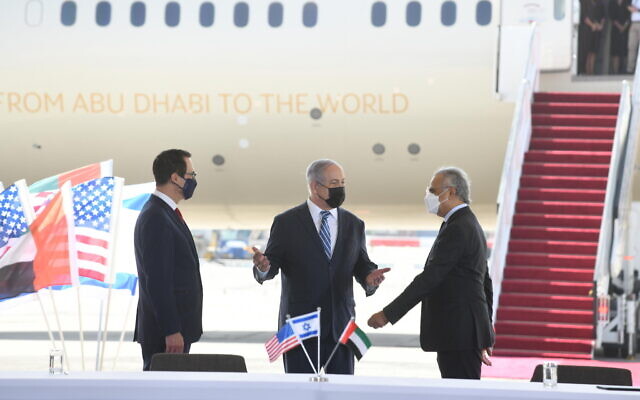A branding expert’s tips for Israeli businesspeople include “tone down the chutzpah” and refrain from pushiness, as the so-called Startup Nation gears up for trade and joint ventures with the UAE after ties were normalized earlier this year.
Israelis are very informal, said Joanna Landau, the founder of Vibe Israel, a nonprofit organization that seeks to showcase Israel and increase its global brand. Israeli culture tends toward “a slap on the back, yalla, let’s go,” she said. Not so for the Emiratis, whose business etiquette is more structured.
“The relationship needs to be mutually respectful, and formal, like with Europe or Japan,” she said.
Landau is currently working with Israel’s Ministry of Economy to upgrade the nation’s international business messaging. She will be speaking about Israel and the importance of its branding on Wednesday in Dubai, at the first Israel-Emirati business conference running November 24-26, organized by Bank Leumi Le-Israel Ltd., the Calcalist financial website and Channel 13. Vibe is one of the sponsors of the conference.
Since the Abraham Accords were signed in September, Israelis and Emiratis have been abuzz with excitement regarding the potential for trade ties and business ventures between the countries. Israel’s Economy Ministry has estimated that the normalization of ties between Israel and the United Arab Emirates could be worth hundreds of millions of dollars a year to Israel in trade and investments. According to figures compiled by the ministry, based on various scenarios, exports to the UAE, which are currently at around $300,000 a year, could jump to an annual $300 million-$500 million.

Joanna Landau, the founder and CEO of Vibe Israel (Courtesy)
Ahead of the conference, Landau and Israel’s Foreign Trade Administration hosted a seminar with consultant Nasif Kayed, who is known as “The Arab Culturalist” for his expertise in Emirati history, business culture and traditions.
During the seminar Kayed talked about business etiquette in the UAE, provided an overview of cultural norms and differences in the region, recommended some dos and don’ts, and offered tips on how to successfully navigate in multicultural environments.
Getting to know the business nuances before starting to do business with foreign countries like India or China is always a good idea, Landau said in a phone interview with The Times of Israel. But because the ties with the Arab world are “sensitive and loaded,” it is even more important “to go that extra mile,” she said.
“In Israel we think that because we are also from the Middle East, we know them. We assume that the cultures are similar, but they are not,” she said.
“Israelis are known as go-getters — people who are agile and quick to find solutions. Even if they are imperfect, an Israeli gets the job done. If access from the door is blocked, Israelis get in through the window,” Landau said. Their impatience makes them “eager to close deals quickly.”
Emiratis, however, take their time in getting to know their business partners, so patience is key. “Once they strike a deal, once they get to know you, they will be very loyal.”
With the UAE, she said, we have “just one chance to make a good impression, to study the differences in our cultures and be respectful of these differences.”

US Treasury Secretary Steven Mnuchin (L), Prime Minister Benjamin Netanyahu (C) and UAE Minister of State for Financial Affairs Obaid Humaid Al Tayer (R) at Ben Gurion Airport, October 20, 2020 (Amos Ben Gershom/GPO)
As the US and European economies are looking inward, focused on repairing their economies from the havoc caused by the coronavirus pandemic, it is now an optimal time for Israel and the UAE to seize this opportunity to become a regional powerhouse together. Landau calls such an effort a “digital spice route,” in homage to the historical trade route that existed between civilizations in Asia, Northeast Africa and Europe.
Israel and the UAE can become a hub for scientific research, conferences and business for the whole region, she said, with both sides benefiting from the relationship. And that relationship should be built up carefully and strategically. “We need to think for the long term, not just the short term,” she said.
Landau also stresses the importance of eye contact when meeting with a potential business partner, and in taking the time for small talk before striking up business talk. Learn a few Arabic words with which to start the conversation, and make sure to pronounce names accurately, she urges.
Emirati businesspeople tend to be late to meetings — not out of rudeness, but because that is the way it is. So, if time is of essence, she said, make sure it is clear that 9 o’clock means 9 o’clock, and not a flexible version of that time.
Always accept proffered food or drink, she said — and accept it with your right hand — though you don’t have to eat or drink it. Never give your hand to a woman; if you are a woman, extend your hand only if the person extends theirs first. If there is a woman in the elevator, ask before you join her, she said, and don’t make any public displays of affection.
Also, because of sensitivities, best steer away from politics.
Related posts:
Views: 0
 RSS Feed
RSS Feed

















 November 24th, 2020
November 24th, 2020  Awake Goy
Awake Goy  Posted in
Posted in  Tags:
Tags: 
















